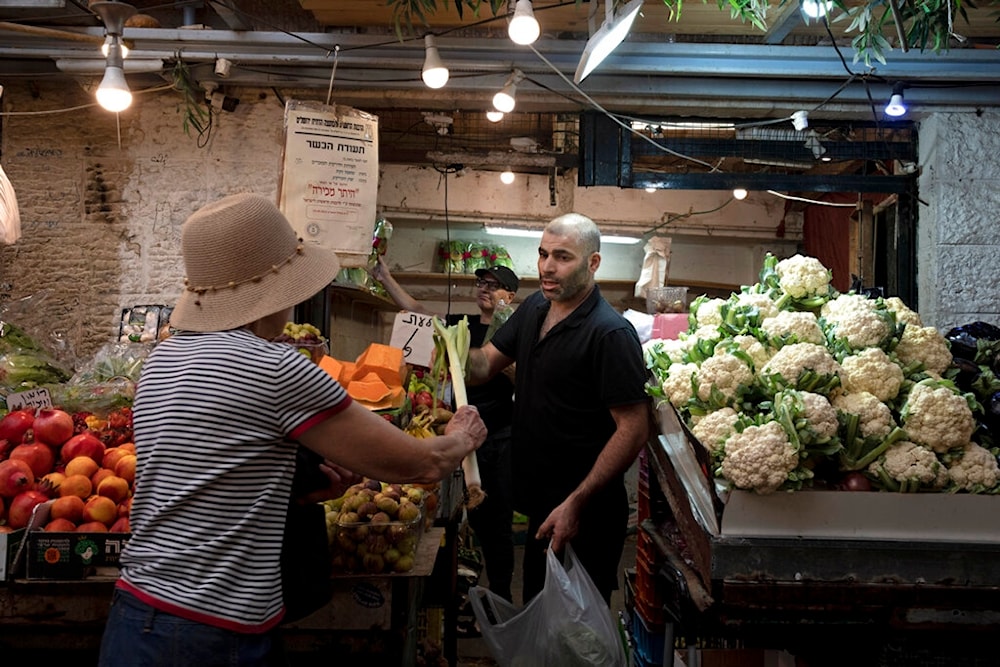Unemployment projected to rise in 'Israel' in light of war on Gaza
Israeli media says there are concerns about poverty and unemployment in light of the war on Gaza amid already-rising levels of poverty within the Israeli occupation.
-

A woman shops for vegetables in the "Mahane Yehuda" Market in occupied al-Quds, occupied Palestine on Sunday, September 25, 2022. (AP)
The Israeli occupation's National Insurance Institute published its Poverty Report 2022, which showed growing poverty rates and the severity of social and economic issues within "Israel" amid already growing fears of the exacerbation of said issues in light of the war on Gaza, the Israeli Ynet website reported on Thursday.
The Israeli news website said it was difficult to change the policy of the Israeli government to prevent the families affected by the war from slipping below the poverty line, saying the government's impotence was leading settlers to the edge of the poverty line, and allowing them to fall into poverty before any attempts at intervention.
Moreover, the Israeli news outlet stressed that there was a growing concern about exacerbating poverty due to the war, as reservists "will be in the poverty report next year."
The social and economic conditions are prompting "grave concerns", the report said, wherein it was found that the poverty rates were steep, as 1.98 million residents of "Israel" lived below the poverty line in 2022.
While employment is "one of the main means of lifting people out of poverty," the report states, this does not necessarily happen "when wages are low, as poverty among working families is becoming an increasingly common phenomenon."
Food insecurity
30.9% of adults in the occupied territories lived in "food insecurity for economic reasons" in the second and third quarters of 2023, 12.6% of which had very low food security, and 18.3% had low food security, according to a survey conducted by the National Insurance Institute.
Talking to Ynet, the head of the Israeli Food Security Council, Professor Roni Strier, stressed that 2022's report was as dangerous as previous reports, as it demonstrates the erroneous policy that has been causing an increased level of poverty.
According to Strier, the poverty rate within the Israeli occupation was "among the highest in the world," adding, "If we talk about poverty as a lack of job opportunities, social security, housing, and food, then Israel excels in striking down these four areas of security."
The data, Ynet said, reinforces what Strayer said. In 2022, the percentage of those feeling poor and the percentage of families unable to cover all their expenses increased, and the rate of those giving up a meal at least once every two days and recreational activities for economic reasons also increased.
Since the mark of the war on Gaza, workers have been drafted to serve with the Israeli occupation forces, marking a drastic economic stump for "Israel". Before the war, only 3% of the workforce was missing from labor markets. The statistic saw a 17% jump following October 7, according to the Taub Center for Social Policy Studies, an Israeli think tank.
Workforce in shambles
Consequentially, 20% of the Israeli workforce, or 900,000 Israelis, are now either enlisted in the IOF, unemployed at home, fled from settlements where attacks have been concentrated, such as by the borders of Lebanon and Gaza, or are unable to work due to the destruction of their work industry.
Although negative estimates of Israeli economic growth have been a concern for the occupation, accounting for the material losses it has experienced, as well as the drastic cost of war, the "Bank of Israel" projected an ambitious 2% growth, referencing previous wars and the Covid-19 epidemic that did not affect the economy as expected. However, different sources claimed that if the Israeli economy were to see growth, it would top at 0.5%.
“The wide range of projections that we are seeing comes from some of the different assumptions about how long and how intense the fighting will be,” said the vice president of research at the "Israel Democracy Institute" and a former governor of the "Bank of Israel," Karnit Flug.
On Sunday, the Taub Center revealed that almost 200,000 Israelis filed for unemployment compensation since October 7.
Moreover, around 300,000 Israelis were drafted as reservists, 139,000 of whom were withdrawn from the workforce. This signifies the second-largest reserve draft in the occupation's history, the first being during the Yom Kippur War.
The occupation government had delivered aid to reservists who had to leave their jobs, but benefits have been slower than anticipated.
Economic disaster, unpayable debt
The chairman of the Israeli government's oversight committee and member of the Knesset, Mickey Levy, warned that the occupation entity is "facing an economic catastrophe" under the government of Israeli Prime Minister Benjamin Netanyahu.
Talking to the Israeli Maariv newspaper on December 21, the senior official said that the "government budget has become a plundering budget," criticizing Netanyahu's actions as "ridiculous and frightening."
Providing more details, Levy explained that the Israeli government has inserted "illogical" issues in the 2023 budget, such as allocating over 600 million shekels to bolster "Jewish identity and culture," questioning whether "identity awareness" required such spending.
Furthermore, he added that there are "unnecessary ministries in the government," noting that in the past, there were fewer than 30 ministers, but now there are 38 ministries, at least 10 of which are non-essential.
"At a time when every shekel is supposed to go towards war efforts, in this government, no one seems to care," added the Knesset member.

 5 Min Read
5 Min Read








